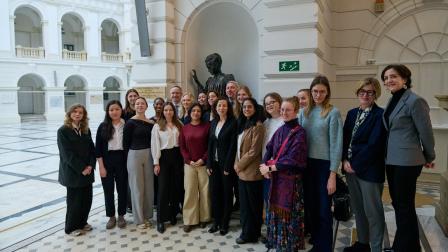Home » News » Important information »
Visit of the Executive Vice-President of the European Commission at WUT
On January 20, 2025, Roxana Mînzatu, Vice-President of the European Commission, visited the Warsaw University of Technology, accompanied by a delegation consisting of: Ms Pia Ahrenkilde Hansen (Director-General of DG EAC), Mr Stephan Hermanns (Director of DG EAC), Ms Katarzyna Smyk (Head of EC Representation in Poland), Ms Vanessa Debiais-Sainton (Member of Cabinet), Ms Annukka Ojala (Member of Cabinet), Mr Paul Moley (Communication Adviser, Cabinet), and Ms Nais Rigollet (Policy Coordinator, DG EAC). Warsaw University of Technology was the only university visited by the Vice-President during her stay in Poland. The organisation of the visit was coordinated by the Centre for International Cooperation and the University authorities.
Vice-President of the European Commission, members of the delegation, representatives of the Authorities and female students of WUT. Photo: BKiP PW.
The Vice-President of the European Commission and her delegation began their visit with a meeting with 14 female students from the Warsaw University of Technology. The meeting was attended by representatives of the Student Union, regular program students, Erasmus+ students, and participants in short educational programs within the ENHANCE Alliance. Among the participants were students from Poland, India, Ecuador, Nigeria, Turkey and Mongolia. During the lively discussion, topics such as the motivation of students to choose the Warsaw University of Technology, their future plans, ways to encourage women to study STEM fields, and support for their choices were discussed.
The delegation then met with the Rector and the authorities of the Warsaw University of Technology. The meeting covered future European Union programs related to higher education, activities undertaken by the Warsaw University of Technology within the ENHANCE Alliance, such as short-term offers and language tandems, preparatory actions necessary for the European degree, promotion of technical fields in secondary schools, and addressing issues like drop-out and brain-drain.

